Why Choosing the Right Ford Fiesta Engine Parts Matters for Longevity
Wiki Article
Unlocking the Power of Engines: A Comprehensive Overview to Efficiency and Efficiency
Comprehending the complex technicians of engines is critical for both efficiency fanatics and day-to-day chauffeurs. The solutions might redefine our strategy to engine efficiency and efficiency in ways that are both enlightening and necessary.Recognizing Engine Essentials
What constitutes the fundamental technicians of an engine? At its core, an engine is an equipment designed to convert fuel into mechanical power with a series of regulated surges or burning procedures.The crankshaft after that transforms this direct motion right into rotational power, which ultimately powers the vehicle. The camshaft controls the opening and closing of the shutoffs, controling the intake of air and fuel and the expulsion of exhaust gases. Additionally, the engine relies on a meticulously adjusted fuel-air mix, ignition system, and cooling system to guarantee optimum efficiency and efficiency.
Comprehending engine fundamentals also involves identifying the significance of engine cycles, such as the four-stroke cycle, that includes intake, power, compression, and exhaust strokes. Each stage is vital in making certain the engine works smoothly and properly. Proficiency of these essential technicians lays the groundwork for exploring extra complicated engine dynamics and performance metrics, important for enhancing both power outcome and efficiency.
Secret Performance Metrics
Trick efficiency metrics are necessary for evaluating an engine's performance and power result, supplying important understandings for both manufacturers and consumers. These metrics function as standards for engine performance, permitting educated decisions in design, acquiring, and production.One of the main metrics is horse power, which evaluates the engine's ability to perform job over time. Torque, measured in pound-feet, is an additional important statistics that suggests the engine's rotational force, directly impacting velocity and lugging ability. Fuel performance, typically measured in miles per gallon (MPG) or litres per 100 kilometers (L/100km), examines just how effectively the engine converts gas right into movement, influencing functional expenses and ecological factors to consider.
Additionally, thermal performance actions exactly how well an engine converts fuel energy right into beneficial work, revealing understandings into energy losses primarily with heat. Exhaust levels, consisting of CO2 and NOx, are also essential, showing the engine's environmental effect and compliance with regulative requirements.

Tuning Techniques for Efficiency
Tuning techniques play a substantial duty in enhancing engine efficiency by maximizing performance metrics determined in earlier discussions (ford fiesta engine). Numerous approaches exist to fine-tune an engine, each adding to boosted fuel economic situation and decreased dischargesOne efficient technique is readjusting the air-fuel proportion, making sure the engine operates within the optimal combustion routine. A leaner blend can improve gas effectiveness, however it should be stabilized to avoid misfires or engine knock. In addition, reprogramming the engine administration system can alter criteria such as ignition timing, which even more enhances effectiveness while preserving power output.
Another crucial approach involves customizing the intake and exhaust systems. Upgrading to high-performance air filters and exhaust headers can lower back pressure, promoting far better airflow. This permits the engine to take a breath more freely, causing enhanced burning performance.
Additionally, the application of innovative adjusting devices, like dyno screening, provides accurate data that makes it possible for targeted changes. Routinely monitoring these efficiency metrics makes certain that tuning initiatives yield the wanted performance outcomes. Jointly, these methods not just strengthen engine performance but likewise add to long-lasting sustainability in engine operations.
Upkeep for Optimum Efficiency
Normal engine upkeep is important for accomplishing optimum efficiency and durability. A well-kept engine not only operates efficiently however likewise decreases the danger of pricey fixings and failures. Trick parts requiring routine focus include oil, filters, belts, and ignition system.Transforming the engine oil at advised intervals is critical, as oil lubes relocating components and avoids getting too hot. In a similar way, changing oil and air filters makes certain that pollutants do not impair engine feature. Disregarding these elements can result in reduced effectiveness and prospective engine damage.
Furthermore, checking and changing worn belts and hoses is vital to avoid unexpected failings. Timing belts, particularly, need to be changed according to the supplier's timetable to find out here now stay clear of disastrous engine damages.
Ignition system should likewise be examined and replaced as essential, since they play a crucial duty in ignition and fuel performance.
Future Patterns in Engine Innovation
Welcoming developments in innovation, the future of engine design is poised to change efficiency and efficiency throughout different applications. Among the most significant trends is the change towards electrification. Hybrid and fully electrical powertrains are becoming significantly mainstream, providing lowered emissions and boosted gas performance. This change is not simply a trend but a necessity driven by governing pressures and consumer demand for lasting options.Furthermore, technologies in materials scientific research are causing lighter, more powerful elements that enhance engine efficiency while minimizing energy usage. Advanced production strategies, such as 3D printing, permit the development of complex geometries that enhance air flow and thermal management, therefore enhancing burning processes.
Additionally, the assimilation of fabricated knowledge and ford fiesta engine device understanding is readied to change engine diagnostics and performance tuning. These innovations can assess vast amounts of data in genuine time, allowing anticipating maintenance and customized efficiency improvements.
Conclusion
In conclusion, unlocking the power of engines calls for a complete understanding of their mechanics and efficiency metrics. Carrying out reliable tuning strategies and sticking to normal upkeep practices substantially boost click to investigate engine capabilities.Furthermore, the engine counts on a meticulously calibrated fuel-air mixture, ignition system, and cooling down system to make sure optimum efficiency and effectiveness.
Comprehending engine essentials also involves identifying the relevance of engine cycles, such as the four-stroke cycle, which consists of intake, compression, exhaust, and power strokes. Mastery of these essential mechanics lays the groundwork for checking out more complex engine dynamics and performance metrics, vital for enhancing both power result and effectiveness.

Accepting developments in innovation, the future of engine layout is poised to transform performance and performance throughout various applications.
Report this wiki page